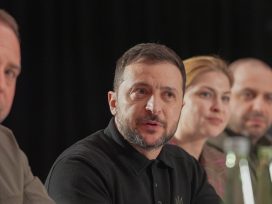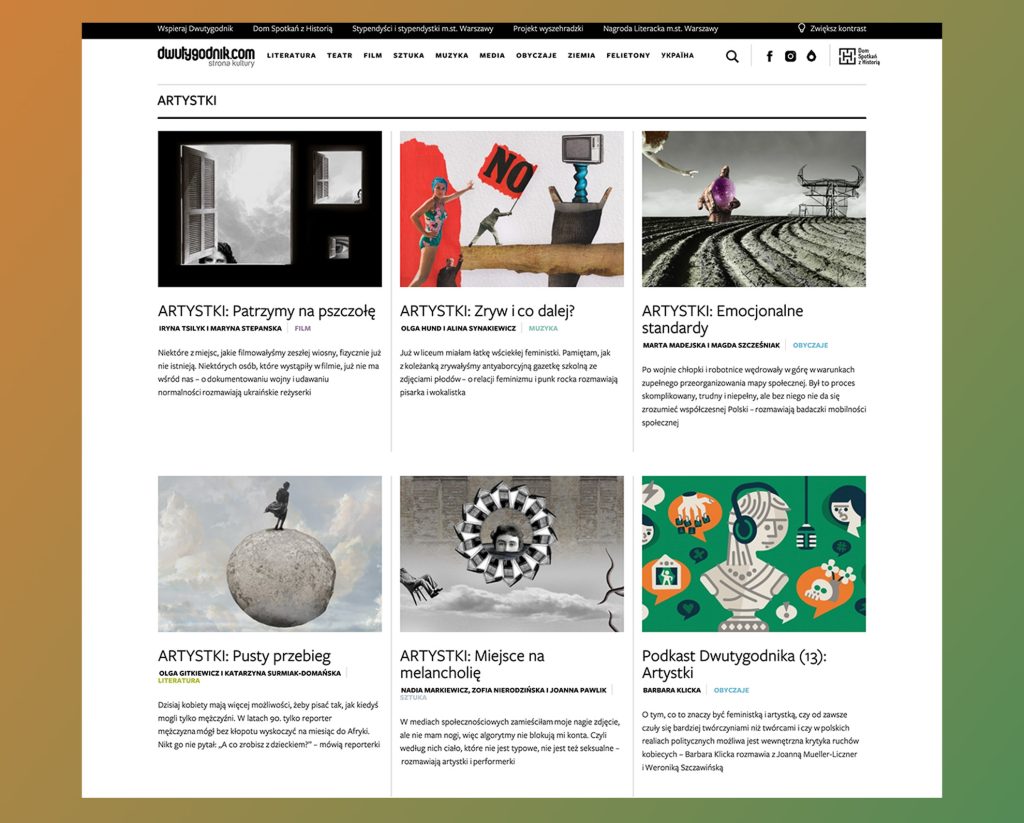
The ‘Trump–Putin deal’ again places Ukrainians in a subaltern role. The leaked contract with its fantasy $500 billion ‘payback’ has been compared to Versailles, but the US betrayal recalls nothing so much as Molotov–Ribbentrop.
Female artists and writers reflect on forms of (im)mobility: why Agnieszka Holland’s film ‘Green Border’ is too middle-class; cultural stasis as perceived by Ukrainian filmmakers Maryna Stepanska and Iryna Tsilyk; and the hidden history of Poland’s upwardly mobile internal migrants.
The run-up to Poland’s bitterly fought election on 15 October generated a spate of anti-immigrant stories in pro-government media, with suggestions that non-white newcomers are part of a ‘special operation’ orchestrated by Russia. Migrants from Africa and the Middle East, openly encouraged by the Belarusian leadership to enter the EU through the forest that borders Poland and Belarus, have been pushed back by Polish border guards and left to wander the exclusion zone for weeks, dodging hunts with dogs and batons. The number of deaths is undocumented.
Agnieszka Holland’s new film Zielnona Granica (‘Green Border’) expresses outrage at Poland’s heavy handed and often brutal treatment of overland migrants. The film was denounced by PiS ministers as it premiered at the Venice Film Festival in September. Comparisons were made with anti-Polish Nazi propaganda. Writing in Dwutygodnik (no. 369), Iwona Kurz condemns the government onslaught as
a fundamental infringement of free speech, artistic expression and the elementary rights of public debate. The attacks show the pathological growth in the Polish imagination of the narcissistic myth of ‘purity’ and a fixation on the image of an unsoiled Polish military uniform. It’s an extraordinary mix. In invoking associations with the Nazi occupation, the authorities are completely inverting the situation. They sustain an attitude that seeks to turn Poland into a historical reconstruction camp, a huge simulation, a projection of some kind of mythological purity that washes away any dirt from a country ruled by carrot and stick.
Yet despite the bold topicality of the film, its robust defence of the right to leave one’s country to live in another, and its implied criticism of the Polish liberal middle class (‘for whom helping people wandering in the woods is “too much”’), Holland’s emphasis on migrant families suffering and dying in the Białowieża forest diminishes the underreported social issue of poverty and deprivation in the border region.
‘The fact that the film leans so heavily on the global middle-class community seems to me problematic,’ writes Kurz. ‘Migrants are shown to be “people like us” – educated, multilingual, relatively well-off. They have bought plane tickets, paid middlemen and have cash for the journey. But the local population of Podlasie is all but absent. Their views feature as brief clips and the experience of long-term living and dying in the forest region fades into the background.’
In a dialogue about the pitfalls of filmmaking in times of international tension and war (no. 370), Ukrainian film director Iryna Tsilyk remarks: ‘In an era of post-truth even the simplest image can appear to be the reflection of a reality constructed to the advantage of a particular side or grouping.’
Her interlocutor, the Ukrainian filmmaker Maryna Stepanska, comments that in conditions where people and places disappear overnight, the limitations of cinema are more pronounced. ‘As a medium, film is slow,’ Stepanska says. ‘It’s not really suitable for conveying and reworking the here and now, especially when events are so extreme. News reporting from the field is a different matter, but creative cinematography demands distance to project a vision by juxtaposing fragments of different realities.’
War with Russia has created a temporal gap, a limbo, in which all notions of past and future fail. ‘The sense of a future is so rooted in the past that everything seems transformed into recurring nostalgia,’ Stepanska observes. ‘It seems to me that the only vision of the future of which we are capable at the moment is just that: an endless recycling of longing for what has been. We cannot imagine a future. Conceptually, it doesn’t exist. There is only the here and now.’
Writer Marta Madejska and cultural historian Magda Szcześniak discuss experiences of social mobility and the search for a better life within Poland since World War II. The country as it is today was built very largely by people from impoverished agricultural communities who migrated from the countryside to cities, initially under state socialism, and later in the 1990s. Focusing on women who made the move from villages, and whose lives remain largely ignored by social research, Madejska and Szcześniak outline the emotional impact of rural to urban migration, and the break-up of traditional agrarian networks and communities.
Newcomers to cities met with abuse and class prejudice at work, in the streets, and within their new families. They had to find ways of behaviour that were deemed acceptable, learn an unfamiliar, more muted language to express their feelings, and often supress what they knew. But they also experienced a real sense of liberation from fixed patriarchal structures.
‘Apart from job opportunities and the chance to gain professional qualifications, the stories told by women point to emancipation in their private lives, the renegotiation of emotional relationships, and demands for a more just division of labour at home,’ Szcześniak says. ‘Efforts to join the ranks of the intelligentsia led to acute pain and psychological stress, however. Sources show how, throughout the existence of the People’s Republic of Poland, the intelligentsia fought for hegemony.’
Although, under communism, the Polish intelligentsia maintained its monopoly over publishing, manners, taste and the correct use of language, ideas promoting social equality and fairness were very widely supported. ‘The diaries of upwardly mobile people show a strong conviction that levelling out class differences was important and should be implemented. They really believed this. Today, the egalitarian language of socialism is mocked as a hypocritical smokescreen. But my research has shown that the notion of social equality was internalised by many, taken seriously and to some extent followed through on an unprecedented scale.’
Published 13 October 2023
Original in English
First published by Eurozine
Contributed by Dwutygodnik © Eurozine
PDF/PRINTSubscribe to know what’s worth thinking about.

The ‘Trump–Putin deal’ again places Ukrainians in a subaltern role. The leaked contract with its fantasy $500 billion ‘payback’ has been compared to Versailles, but the US betrayal recalls nothing so much as Molotov–Ribbentrop.

Ukraine faces its greatest diplomatic challenge yet, as the Trump administration succumbs to disinformation and blames them for the Russian aggression. How can they navigate the storm?